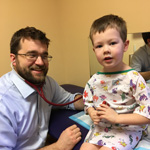
You may have heard about the respiratory syncytial virus (RSV) from a friend, family member or even your pediatrician. But what is RSV? Is it a serious issue? Should you see a doctor or go to the ER if your kid has RSV?
Below is a guide to help you better understand RSV.
What Is RSV?
Respiratory syncytial virus or RSV, for short, is one of the most common causes of infections in the lungs and the respiratory tract. Most children have been infected by this virus by the age of 2 years old. It’s commonly thought of as a childhood disease, but it can affect adults, too.
For the most part, RSV is not a major cause for concern in older kids and adults who are healthy. Its symptoms are similar to the common cold, and many parents may mistake RSV for the common cold.
However, RSV can be dangerous in some people, such as premature babies and infants, elderly adults, people with heart and lung disease, or anyone with a weakened immune system.
What Are The Signs & Symptoms Of RSV?
The signs of RSV usually appear about 4-6 days after exposure to the virus. The most common symptoms include:
- Stuffy or runny nose
- Sore throat
- Coughing
- Fever
- Mild headaches
If you notice these symptoms, you can usually treat your child just like you would if they had a common cold. Cold medicine and pain relievers can help relieve their symptoms, which should mostly disappear within 2-8 days.
More serious cases of RSV may include symptoms like:
- Severe cough
- Wheezing when exhaling
- Rapid breathing or difficulty breathing. The child may want to sit up rather than lie down
- Bluish color of skin (cyanosis) due to inadequate blood oxygen
This is quite rare in children with healthy immune systems. However, if you notice these issues, get medical help for your child right away.
In infants with severe RSV, you may also notice other signs and symptoms like:
- Short, rapid or shallow breathing
- Irritability
- Poor feeding
- Lethargy (tiredness)
You should get help for serious RSV infections right away, as they can lead to more serious problems like bronchiolitis or pneumonia.
Know The Basics About RSV – And When To Get Help!
If your child is strong, healthy and free of any major health issues, RSV is usually not cause for alarm. However, if your child is very young or premature, has a compromised immune system, or has other heart or lung conditions, RSV can be very dangerous.
It’s better to be safe than sorry. If you think your child has RSV or may be suffering from another similar illness, you can always bring them into Pediatric Associates of Franklin. We’ll make sure they get the help they need!
The information and content on our website should not be used as a substitute for medical treatment or advice from your doctor.

